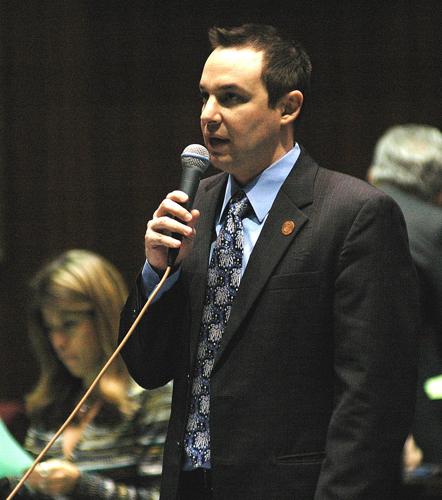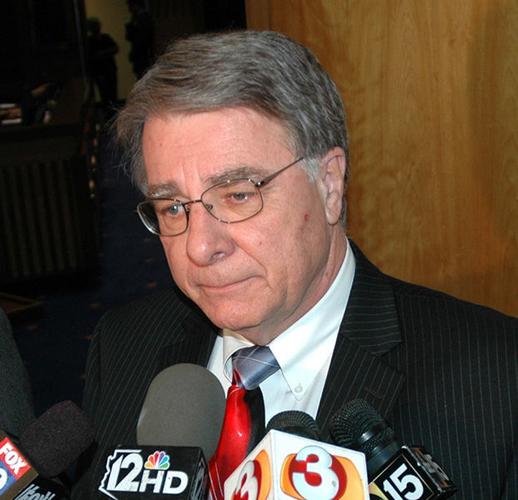PHOENIX — The state’s Libertarian Party is asking a federal judge to void a law that Republican lawmakers effectively admitted was enacted to make it harder to put their candidates on the ballot.
In legal papers filed here, attorney Oliver Hall noted the GOP-controlled Legislature reconfigured Arizona election laws to change the number of signatures required for a candidate to get on the ballot.
On paper, all parties are treated the same: They need the signatures of one-fourth of one percent of eligible voters. That’s down from one-half of one percent.
But lawmakers added a twist by redefining who are the “eligible voters” who can sign the petition.
It now includes not only members of that person’s party but also anyone who is registered as a political independent — therefore increasing the base number of voters that is used to calculate the number of signatures needed.
With the decrease in the percentage by half, that’s no big deal for Democrats and Republicans.
But Hall said the change means a Libertarian candidate, who needed only one-half percent of Libertarians in the state or district, might have to gather 20 to 30 times as many signatures under the new law compared to what was required before. And that, he charges, shows the law is effectively designed to make it harder for Libertarians to run for office.
He’s not entirely off base.
During debate over the 2015 measure, Sen. Steve Yarbrough, R-Chandler, conceded as much.
“What we have is that people who have historically been third-party candidates (who have) been able to get on the ballot with an incredibly small number of signatures,” he complained.
And Rep. J.D. Mesnard, R-Chandler, who sponsored the legislation, conceded that his real goal is removing what he sees as hurdles that can keep GOP candidates from winning.
He said people try to “manipulate” the outcome of elections by backing third-party candidates who can can get on the ballot with just a handful of signatures. And Mesnard believes that some Republicans that he contends should have won their elections lost because votes went instead to Libertarians.
The numbers tell the story of what Hall calls disparate treatment.
Using the new formula, a Republican candidate for statewide office needs 5,790 signatures on petitions. That’s one-quarter of a percent of both registered Republicans and independents.
Had the old formula been in place — one-half percent of just Republicans — a GOP candidate would need 5,660 signatures.
But here’s the thing: a Libertarian running for governor or other statewide office now needs to gather 3,023 signatures, a quarter percent of both independents and Libertarians. Under the old formula, just 134 signatures — one-half percent of Libertarians — would have qualified someone to run in the Libertarian primary and, if chosen there, have their name on the general election ballot, more than 22 times as many.
Hall acknowledged that, technically speaking, the law is the same for everyone: Get a percentage of signatures from anyone who can sign. And that means members of the candidate’s own party and independents.
“Laws can be facially neutral, but in their application, have an unequal effect,” he said. And that, Hall is telling Judge David Campbell, makes it unconstitutional and legally unenforceable against the Libertarian Party.
Mesnard, however, said if someone whose name will be on the general election ballot as a candidate for governor, he or she should first have to show some base of support. He said allowing someone to be a candidate for governor with just 134 signatures “makes it meaningless.”
Then there’s his contention that minor party candidates siphon votes from major party candidates.
“My mom in CD 9 (in Southeast Arizona) was getting mail from the Democratic Party backing the Libertarian candidate,” Mesnard said.
“Let’s be honest: Politics is politics, and parties will try to manipulate things if you can,” he said. “When you only need 100 and whatever signatures to run for governor, or you only need 10 or a dozen signatures to run for the Legislature because your party has such low numbers ... it just doesn’t make a lot of sense. In my opinion, it makes a mockery of the system and also opens it up for manipulation.”
Mesnard contends that’s already happened. When the issue was first debated, he claimed that one or two 2012 congressional races did not go “in the direction I would have liked to have seen them go.” The results, Mesnard argued, would have been different had the new signature requirement been in place.
In CD 1, Republican Jonathan Paton fell short in his bid to oust incumbent Democrat Ann Kirkpatrick. Paton garnered 113,594 votes against 122,774 for Kirkpatrick. But Libertarian Kim Allen picked up 15,227 votes — votes Mesnard contended likely would have gone to Paton to help him win.
Similarly, in the newly created CD 9, Democrat Kyrsten Sinema bested Republican Vernon Parker by 10,251 votes, with Libertarian Powell Gammill tallying 16,620.
And to drive the point home to his GOP colleagues, he pointed out that the new requirements would also affect legislative races. Mesnard told them that if they didn’t support the change, they could be personally affected in their next race.
“I can’t believe we wouldn’t see the benefit of this,” Mesnard told fellow Republicans.
Barry Hess, who has been the Libertarian Party candidate for governor several times, has said Republicans are sadly mistaken if they think keeping Libertarians out will result in the election of more GOP candidates.
“They really are so small-minded as to think that Libertarians are just going to vote for anybody, a lesser evil,” he said.
There is no date for a court hearing, and it remains unclear whether there could be any relief for the party before nominating petitions are due June 1.







